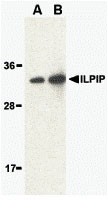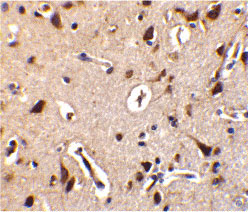ILPIP Antibody
- SPECIFICATION
- CITATIONS
- PROTOCOLS
- BACKGROUND

Application
| WB, IHC-P, E |
|---|---|
| Primary Accession | Q9C0K7 |
| Other Accession | NP_061041, 13027388 |
| Reactivity | Human, Mouse, Rat |
| Host | Rabbit |
| Clonality | Polyclonal |
| Isotype | IgG |
| Calculated MW | 47026 Da |
| Application Notes | ILPIP antibody can be used for the detection of ILPIP by Western blot at 1 to 2 µg/mL. Antibody can also be used for immunohistochemistry starting at 10 µg/mL. |
| Gene ID | 55437 |
|---|---|
| Other Names | ILPIP Antibody: PAPK, ILPIP, ILPIPA, ALS2CR2, CALS-21, PRO1038, STE20-related kinase adapter protein beta, Amyotrophic lateral sclerosis 2 chromosomal region candidate gene 2 protein, STRAD beta, STE20-related kinase adaptor beta |
| Target/Specificity | STRADB; |
| Reconstitution & Storage | ILPIP antibody can be stored at 4℃ for three months and -20℃, stable for up to one year. As with all antibodies care should be taken to avoid repeated freeze thaw cycles. Antibodies should not be exposed to prolonged high temperatures. |
| Precautions | ILPIP Antibody is for research use only and not for use in diagnostic or therapeutic procedures. |
| Name | STRADB |
|---|---|
| Synonyms | ALS2CR2, ILPIP |
| Function | Pseudokinase which, in complex with CAB39/MO25 (CAB39/MO25alpha or CAB39L/MO25beta), binds to and activates STK11/LKB1. Adopts a closed conformation typical of active protein kinases and binds STK11/LKB1 as a pseudosubstrate, promoting conformational change of STK11/LKB1 in an active conformation (By similarity). |
| Cellular Location | Nucleus. Cytoplasm |
| Tissue Location | Highly expressed in heart, skeletal muscle, testis, liver and colon. |

Thousands of laboratories across the world have published research that depended on the performance of antibodies from Abcepta to advance their research. Check out links to articles that cite our products in major peer-reviewed journals, organized by research category.
info@abcepta.com, and receive a free "I Love Antibodies" mug.
Provided below are standard protocols that you may find useful for product applications.
Background
ILPIP Antibody: ILPIP (ILP-interacting protein) has recently been shown to interact with XIAP, a member of the IAP (Inhibitor of Apoptosis) protein family. Together, these two proteins synergistically activate the TAK1/JNK1 signal transduction pathway, which acts to protect against the interleukin-1β converting enzyme of Fas-induced apotosis. This protein was independently isolated and characterized as polyploidy-associated protein kinase (PAPK), a member of the Ste20/germinal center kinase family that modulates cytoskeletal organization and cell survival, suggesting that its protective role may be a function of its kinase activity. Although two mRNA sequences have been isolated, only the shorter isoform has been observed.
References
Sanna MG, Correia JS, Luo Y, et al. (2002) ILPIP, a novel anti-apototic protein that enhances XIAP-mediated activation of JNK and protection of apoptosis. J. Biol. Chem. 277:30454-62.
Sanna MG, Duckett CS, Richter BW, et al. (1998) Selective activation of JNK1 is necessary for the anti-apototic activity of hILP. Proc. Natl. Acad. Sci USA 95:6015-20.
Nishigaki K, Thompson D, Yugawa T, et al. (2003) Identification and characterization of a novel Ste20/germinal center kinase-related kinase, polyploidy-associated protein kinase. J. Biol. Chem. 278:13520-30.
If you have used an Abcepta product and would like to share how it has performed, please click on the "Submit Review" button and provide the requested information. Our staff will examine and post your review and contact you if needed.
If you have any additional inquiries please email technical services at tech@abcepta.com.













 Foundational characteristics of cancer include proliferation, angiogenesis, migration, evasion of apoptosis, and cellular immortality. Find key markers for these cellular processes and antibodies to detect them.
Foundational characteristics of cancer include proliferation, angiogenesis, migration, evasion of apoptosis, and cellular immortality. Find key markers for these cellular processes and antibodies to detect them. The SUMOplot™ Analysis Program predicts and scores sumoylation sites in your protein. SUMOylation is a post-translational modification involved in various cellular processes, such as nuclear-cytosolic transport, transcriptional regulation, apoptosis, protein stability, response to stress, and progression through the cell cycle.
The SUMOplot™ Analysis Program predicts and scores sumoylation sites in your protein. SUMOylation is a post-translational modification involved in various cellular processes, such as nuclear-cytosolic transport, transcriptional regulation, apoptosis, protein stability, response to stress, and progression through the cell cycle. The Autophagy Receptor Motif Plotter predicts and scores autophagy receptor binding sites in your protein. Identifying proteins connected to this pathway is critical to understanding the role of autophagy in physiological as well as pathological processes such as development, differentiation, neurodegenerative diseases, stress, infection, and cancer.
The Autophagy Receptor Motif Plotter predicts and scores autophagy receptor binding sites in your protein. Identifying proteins connected to this pathway is critical to understanding the role of autophagy in physiological as well as pathological processes such as development, differentiation, neurodegenerative diseases, stress, infection, and cancer.



